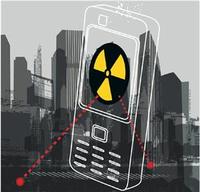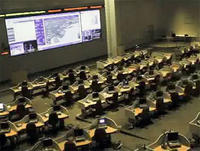-
DHS seeks camera that sees hundreds of kilometers at once
DHS is interested in adding powerful military technology to its growing arsenal of surveillance equipment; the agency is considering new cameras that will be able to track and monitor several moving objects simultaneously over as much as four square miles
-
-
Innovative CCTV protects copper cables
The theft of copper cables has cost the British economy an estimated £770 million a year over the last few years; British company which rely on copper cables to deliver their services are deploying an innovative CCTV to combat the thieves
-
-
Monitoring nukes with social media

Acting Undersecretary of State for Arms Control Rose Gottemoeller is actively trying to find a way to incorporate social media tools to prevent nuclear weapons proliferation and keep fissile materials out of the hands of terrorists; the department wants to have crowdsourcing tools developed that could help ordinary citizens monitor a government’s nuclear activity and whether it was adhering to its stated promises
-
-
LoJack helps recover more than 10,000 stolen cars
On Tuesday LoJack Corporation, the manufacturers of the eponymous vehicle tracking device, released their latest statistics on vehicle theft
-
-
Experts: White House consumer privacy plan seriously flawed
Last week the White House announced its Consumer Privacy Bill of Rights, which would give consumers the right to exercise control over what personal data is collected and how it is used; an expert says more than thirty years of experience with control-based laws has demonstrated that they don’t work and they don’t protect consumer privacy
-
-
House grills DHS for monitoring Twitter, Facebook
Earlier this year reports surfaced that DHS had awarded General Dynamic an $11 million contract to engage in monitoring of social networks; members of both parties including blasted DHS officials for potentially violating the First Amendment and collecting information on citizens engaged in protected political speech
-
-
FBI seeks system to monitor social networking sites

The FBI, seeking to monitor conversations on social networks like Facebook and Twitter, recently placed a request for information from technology companies to develop a system capable of automatically sifting through the torrents of “publicly available” data for keywords relating to terrorism, crime, and other matters of national security
-
-
GPS shoe helps track seniors with Alzheimer’s

For $300 consumers in the United States can now purchase a pair of GPS-enabled shoes to keep track of dementia-suffering senior citizens; after purchasing the shoes, buyers will have the ability to set up a monitoring service to locate lost family members who have Alzheimer’s disease
-
-
FBI limits GPS tracking following Supreme Court case
Following the recent Supreme Court ruling that required law enforcement agencies to have a warrant before they could use GPS tracking devices on a suspect, the FBI has begun scaling back on its use of electronic surveillance
-
-
Thermal imaging proves useful for police
With the help of sophisticated new thermal imaging systems police officers around the United States have been able to apprehend criminals and locate car crash victims in perfect darkness without a hitch
-
-
State Department expands use of drones in Iraq
With the U.S. military out of Iraq, the State Department has taken to operating a small fleet of unarmed surveillance drones to protect American personnel, which has resulted in sharp criticism from the Iraqi government who say the unmanned craft are an insult to Iraqi sovereignty
-
-
Bipartisan panel calls for local emphasis in DHS intelligence

A new report by a bipartisan group of security experts argues that DHS should shift its intelligence gathering efforts away from foreign enemies and focus on local threats by working with law enforcement agencies and the private sector to secure critical infrastructure, the border, and cities from domestic threats
-
-
Helping UAVs to land safely in an emergency

One obstacle to the wider use of UAVs in domestic missions such as law enforcement is the fact that UAV flight plans are set pre-flight, and if something goes wrong and they need to land they have no way to determining where the safest landing spot is; in most cases they just drop; engineers are developing a system which will allow UAVs sense and avoid other traffic and determine appropriate landing spots should the need arise
-
-
Open-source searches help solve cold cases
Two detectives receive the LexisNexis One Step Closer award for effectively using searches of open or third-party information sources to solve cold cases
-
-
CBP receives its ninth UAV
CBP announced it has received its fourth Predator-B UAV to be used for patrolling the U.S.-Mexico border; CBP can now deploy its unmanned aircraft from the eastern tip of California across the common Mexican land borders of Arizona, New Mexico, and Texas
-
- All
- Regional
- Water
- Biometrics
- Borders/Immig
- Business
- Cybersecurity
- Detection
- Disasters
- Government
- Infrastructure
- International
- Public health
- Public Safety
- Communication interoperabillity
- Emergency services
- Emergency medical services
- Fire
- First response
- IEDs
- Law Enforcement
- Law Enforcement Technology
- Military technology
- Nonlethal weapons
- Nuclear weapons
- Personal protection equipment
- Police
- Notification /alert systems
- Situational awareness
- Weapons systems
- Sci-Tech
- Sector Reports
- Surveillance
- Transportation
Advertising & Marketing: advertise@newswirepubs.com
Editorial: editor@newswirepubs.com
General: info@newswirepubs.com
2010-2011 © News Wire Publications, LLC News Wire Publications, LLC
220 Old Country Road | Suite 200 | Mineola | New York | 11501
Permissions and Policies
Editorial: editor@newswirepubs.com
General: info@newswirepubs.com
2010-2011 © News Wire Publications, LLC News Wire Publications, LLC
220 Old Country Road | Suite 200 | Mineola | New York | 11501
Permissions and Policies
